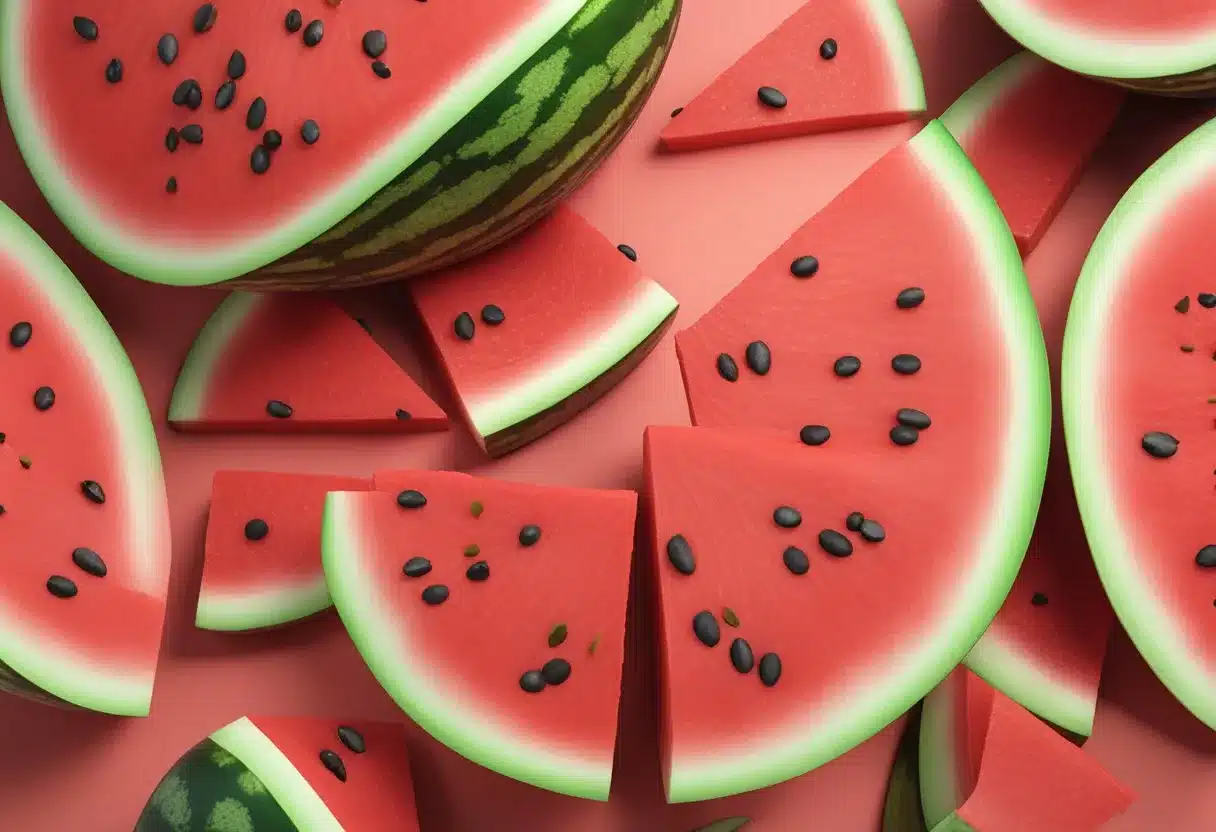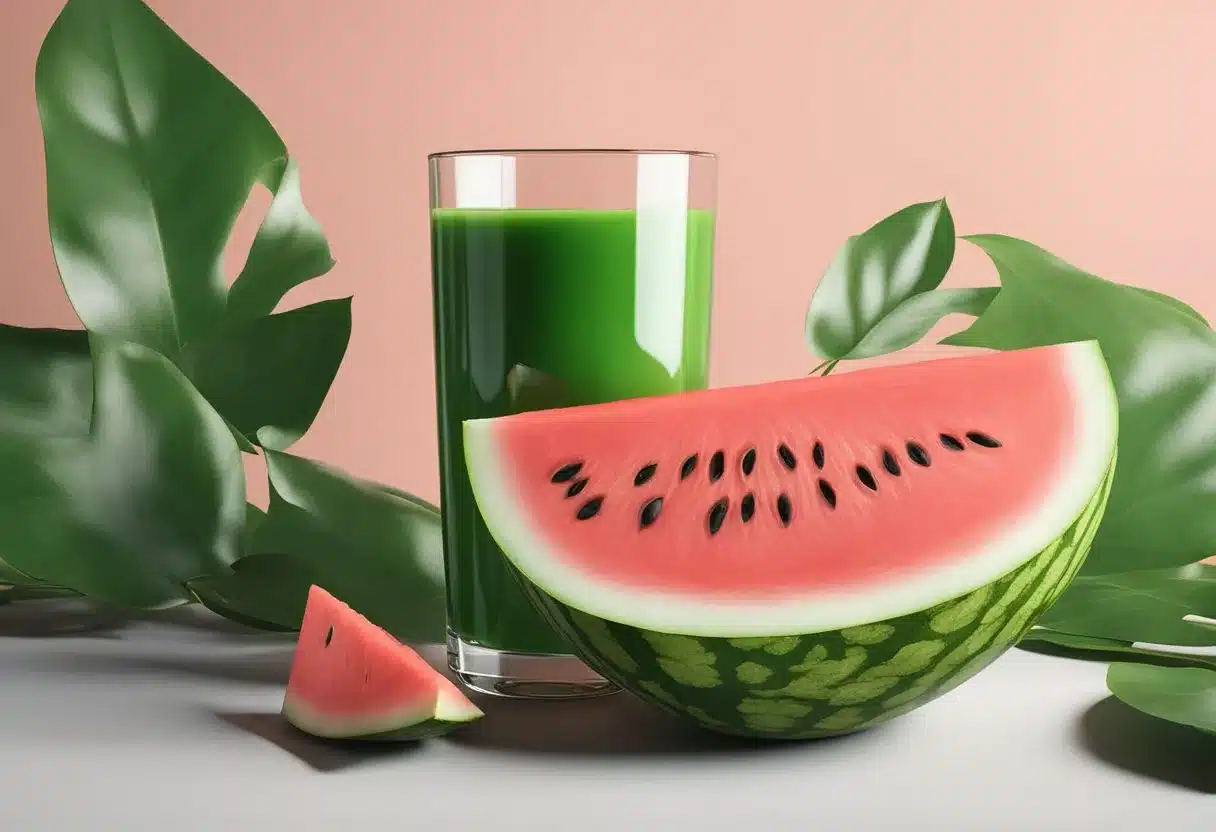Juicy and refreshing, watermelon is a popular summer fruit that offers more than just a sweet treat. Packed with vitamins, antioxidants, and hydration, watermelon can benefit your heart, eyes, and skin. Its low calorie count and high water content make it an excellent choice for those looking to stay healthy and hydrated.
Watermelon is rich in vitamins A, C, and B6, and contains lycopene, a powerful antioxidant. This fruit may help reduce inflammation, lower blood pressure, and even improve insulin sensitivity. For athletes, watermelon could also reduce muscle soreness after exercise, making it an ideal post-workout snack.
In addition to its health benefits, watermelon is versatile in the kitchen. It can be enjoyed on its own, added to salads, or blended into refreshing drinks. From hydrating the body to supporting overall wellness, watermelon is not just a delicious fruit but also a smart addition to any diet.
Key Takeaways
- Watermelon is nutrient-rich and hydrating.
- It supports heart, eye, and skin health.
- It’s versatile and can be used in various recipes.
Nutritional Profile of Watermelon

Watermelon is not only a refreshing fruit but also packed with essential nutrients. It contains vitamins, minerals, and macronutrients that are important for maintaining good health.
Vitamins and Minerals
Watermelon is rich in vitamins and minerals that contribute to its health benefits. It is a great source of vitamin C, which boosts the immune system and promotes healthy skin. A 152-gram serving of diced watermelon provides about 14% of the daily value (DV) for vitamin C, helping to protect the body from oxidative stress.
Additionally, watermelon contains vitamin A, which is important for eye health and immune function. The same serving size offers approximately 5% of the DV for vitamin A. Potassium, another key mineral found in watermelon, helps regulate fluid balance and supports normal muscle function. Watermelon also contains magnesium, which is involved in over 300 enzymatic processes in the body.
Moreover, watermelon seeds are known to be rich in nutrients like iron, zinc, calcium, and magnesium, making them a nutritious snack if dried and consumed.
Macronutrients and Calories
Watermelon is low in calories, making it an excellent choice for those watching their caloric intake. A 100-gram serving of watermelon contains about 30 calories. These calories come primarily from carbohydrates, which make up about 7.5% of the fruit’s composition. The carbohydrates in watermelon include natural sugars that provide quick energy.
Despite being low in fat and protein, watermelon provides a small amount of these macronutrients. A serving contains almost no fat and negligible protein, highlighting its role as a hydrating and low-calorie fruit rather than a protein or fat source.
In addition, watermelon offers a small amount of fiber. For instance, a one-cup serving contains around 0.6 grams of fiber, aiding digestion and helping to maintain a healthy gut. The sugar content in watermelon is natural and includes about 9.4 grams per cup, which contributes to its sweet, refreshing taste.
Health Benefits of Watermelon

Watermelon is a nutritious fruit that offers multiple health advantages. With its high water content, it can aid in hydration and digestion, support heart health, assist in weight management, enhance muscle and nerve function, and help prevent cancer while boosting the immune system.
Hydration and Digestion
Watermelon is made up of about 92% water, making it an ideal fruit for staying hydrated. Proper hydration is essential for various bodily functions like temperature regulation and nutrient transport. It also contains fiber, which promotes healthy digestion and regular bowel movements, reducing the risk of constipation. The combination of water and fiber content in watermelon can help enhance digestive health and prevent dehydration.
Heart Health
Rich in antioxidants such as lycopene, watermelon can help reduce inflammation and oxidative stress, both of which are risk factors for heart disease. Lycopene may also support the health of the arteries and lower cholesterol levels. By promoting the production of nitric oxide, watermelon helps relax blood vessels, improving blood flow and reducing blood pressure. These benefits may collectively lower the risk of cardiovascular diseases.
Weight Management
Watermelon is low in calories and high in water content, which can make it a helpful food for weight management. It provides a sense of fullness or satiety, which can help control overeating. Besides, fiber promotes healthy digestion and helps maintain normal body mass index (BMI) and waist-to-hip ratio. Consuming watermelon can be a part of a balanced diet aimed at managing obesity and maintaining a healthy weight.
Muscle and Nerve Function
Containing essential electrolytes like potassium and magnesium, watermelon is beneficial for muscle and nerve function. Potassium helps regulate nerve signals and muscle contractions, while magnesium is crucial for muscle repair and relaxation. Additionally, the amino acid citrulline found in watermelon can reduce muscle soreness and improve exercise performance. Eating watermelon can help manage cramps and maintain normal muscle and nerve functionality.
Cancer Prevention and Immune Support
Watermelon is rich in lycopene, an antioxidant known to combat free radicals and reduce oxidative stress, potentially lowering the risk of certain cancers. Cucurbitacin E, another compound found in watermelon, has anti-inflammatory properties that may help in cancer prevention. Watermelon’s high vitamin C and vitamin B6 content strengthens the immune system, promoting better health and resistance to infections. Regular consumption can support the body’s natural defenses and promote overall wellness.
Skin and Eye Health

Consuming watermelon offers notable benefits for both skin and eye health. Its rich content of vitamins and hydration contributes significantly to maintaining healthy and glowing skin and protecting the eyes.
Vitamin A and Lycopene Effects
Watermelon is a good source of Vitamin A, which is crucial for eye health. Vitamin A helps maintain clear vision, and its deficiency can cause night blindness. It also supports the health and function of the retina, thus playing a role in preventing conditions like age-related macular degeneration.
Lycopene, a powerful antioxidant present in watermelon, also plays a role in eye health. Studies suggest it helps protect against oxidative damage, which can lead to various eye conditions. Additionally, lycopene may protect the skin from damage due to UV rays from the sun, reducing the risk of sunburn and other harmful effects.
Hydration and Vitamin C Benefits
Watermelon is composed of about 90% water, making it excellent for hydration. Proper hydration is vital for maintaining skin elasticity and preventing dryness. Well-hydrated skin appears more supple and healthy.
Vitamin C in watermelon boosts collagen production, which is essential for skin health. Collagen helps keep the skin firm and youthful. Furthermore, Vitamin C is an antioxidant that protects against free radicals, which can damage skin cells and lead to premature aging. It also strengthens the immune system, contributing to overall skin and eye health.
Vitamin C aids in keeping the eyes healthy by protecting against oxidative stress and potentially reducing the risk of cataracts and age-related macular degeneration. This makes watermelon an excellent choice for enhancing both skin appearance and maintaining eye health.
Dietary and Lifestyle Considerations

Watermelon can be a versatile addition to various diets and lifestyle routines, offering benefits such as hydration and support for exercise performance.
Watermelon in Diets
Watermelon is low in calories and high in water content, making it a great choice for those looking to manage their weight. It can be incorporated into summer salads and snacks, providing a refreshing option that helps keep you hydrated. Registered dietitians often suggest it for its high levels of vitamins A, B6, and C, which are essential for skin health and immune function.
For people with diabetes, moderation is key as watermelon has natural sugars. Although it has a high glycemic index, the glycemic load is low due to its high water content. Those following the low FODMAP diet may also find watermelon to be a friendly choice because it is low in fermentable carbs.
Workout and Lifestyle Integration
Watermelon can be an excellent addition to pre- and post-workout meals. The fruit contains citrulline, an amino acid that may enhance exercise performance by improving blood flow and reducing muscle soreness. Drinking a watermelon smoothie can be a quick way to hydrate and replenish electrolytes after a workout.
Incorporating watermelon into a healthy lifestyle is easy. It can be eaten on its own or included in various recipes like salads and snacks. Even seedless varieties offer the same health benefits without the hassle of seeds, making it convenient for busy individuals.
Watermelon seeds are rich in magnesium, iron, and healthy fats, which can support overall wellness. Adding these seeds to your diet can provide extra nutrients without much effort. In summary, watermelon can be a delicious and beneficial part of a balanced diet and active lifestyle.
Culinary Uses of Watermelon

Watermelon is versatile in the kitchen, finding its way into everything from refreshing drinks to savory dishes. Its seeds can also be incorporated into recipes, adding a unique twist.
Recipes and Food Pairings
Watermelon is perfect for a range of summer recipes. It pairs excellently with feta cheese in a watermelon salad, bringing out a balance of sweet and salty flavors. Adding mint and a drizzle of balsamic vinegar elevates the dish.
In smoothies, watermelon blends well with yogurt and other fruits. Using a blender, you can create a refreshing drink that’s perfect for hot days. Try combining watermelon with berries, Greek yogurt, and a touch of honey.
Adding watermelon to salsas with diced cucumber, red onion, and cilantro gives a fresh twist to traditional recipes. They can be served with grilled meats or fish. Watermelon can also be used in fruit skewers alongside pineapples and grapes for a colorful and hydrating snack.
Preparation and Serving Tips
Choosing a ripe watermelon is key. Look for one that’s firm with a uniform shape and a yellow spot where it rested on the ground.
To prepare, cut the watermelon into manageable pieces. Remove the seeds if not desired. Portion sizes can vary; cubing for salads or cutting into wedges for snacks.
Watermelon can be served chilled, making it an excellent ingredient in drinks like agua fresca. Simply purée with water, lime juice, and a touch of sugar.
Adding watermelon seeds, which are rich in magnesium and iron, to granola or roasting them for a snack can diversify its culinary uses. Lastly, store cut watermelon in the fridge to maintain freshness.
Frequently Asked Questions
Watermelon offers numerous health benefits, including improving hydration, enhancing skin health, and aiding in organ function. It also contains essential nutrients that support overall well-being.
What are the nutritional benefits of consuming watermelon regularly?
Watermelon is low in calories and high in water content, making it a great option for hydration. It is packed with vitamins A, B6, and C, which support the immune system, skin health, and energy production. It also provides important electrolytes like potassium and magnesium.
How does watermelon consumption affect men’s health?
Watermelon contains the amino acid citrulline, which may help improve blood flow. This can enhance exercise performance and may also support cardiovascular health. Additionally, the antioxidants in watermelon can help reduce inflammation and protect against certain diseases, benefitting men’s overall health.
In what ways can watermelon be beneficial for women’s health?
Watermelon is rich in vitamin C, which helps boost collagen production, keeping skin firm and reducing wrinkles. The fruit’s high water and fiber content can aid in digestion and weight management. For pregnant women, watermelon can help alleviate common discomforts like swelling and morning sickness.
Can eating watermelon improve skin health?
Yes, watermelon can improve skin health. The high water content helps keep the skin hydrated. Vitamins A and C found in the fruit also promote collagen production and repair skin cells, leading to a softer, smoother complexion. Vitamin C in watermelon specifically helps with collagen production.
Are there any potential side effects associated with eating watermelon?
Generally, watermelon is safe for most people when consumed in moderation. Eating too much can lead to digestive issues like bloating or gas due to its high water and fiber content. People with diabetes should monitor their intake as watermelon contains natural sugars that can affect blood sugar levels.
How does watermelon support the functioning of specific organs?
Watermelon supports kidney function through its high water content, which helps flush out toxins. The antioxidants and citrulline in watermelon can aid heart health by improving blood flow and reducing inflammation. Magnesium and potassium in watermelon seeds are beneficial for muscle and nerve function. Magnesium and potassium are especially important for maintaining balanced electrolytes and healthy muscles.